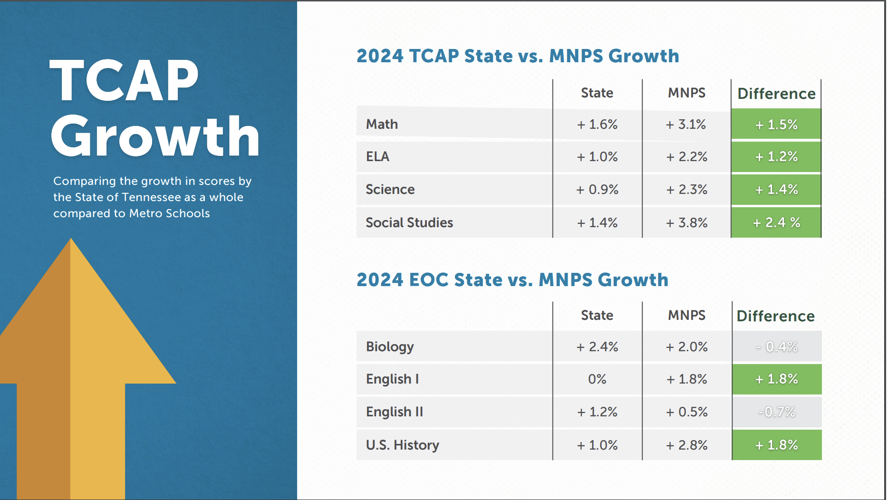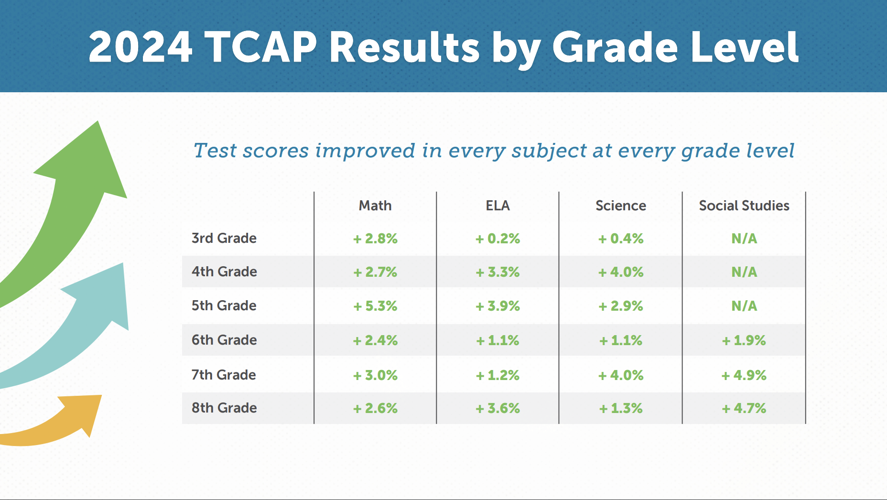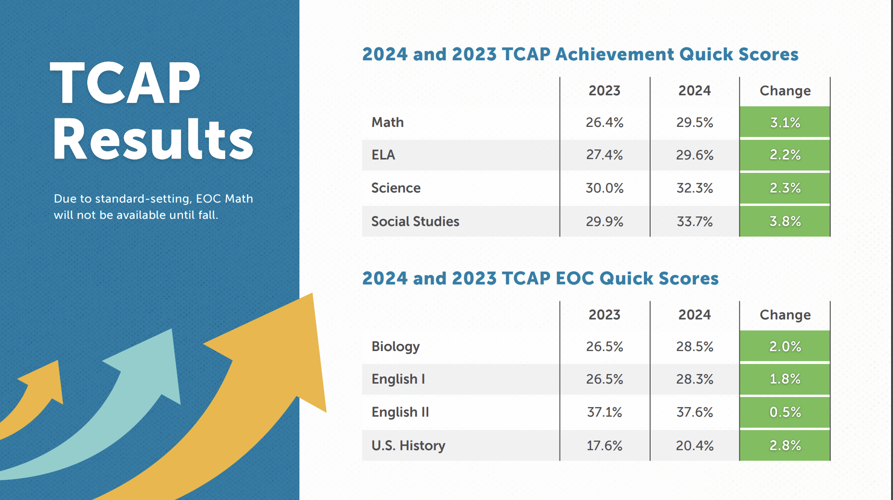The Metro Nashville Public Schools board of education finalized the budget for the next school year, passed new policies and reflected on standardized testing scores during its second June meeting. The district on Tuesday also shared a “State of Schools” video that reflects on MNPS accomplishments from the past year, from opening two new school buildings to securing a scholarship partnership with Vanderbilt University, Pearl-Cohn High School’s football team state championship win and more.
Director of Schools Adrienne Battle touted TCAP gains amid the release of related district-level data. MNPS students saw improvements ranging from 0.5 to 3.8 percent in every category and scored above statewide averages in all but the end-of-course biology and English II categories. Even so, the majority of MNPS students didn’t reach proficiency as defined by the state in each subject category, and significant achievement gaps among students of color, English learners and economically disadvantaged students remain.
In MNPS, 68.7 percent of third-grade and 62 percent of fourth-grade students did not meet state standards on the English language arts portion of the TCAP. These results are particularly relevant because state law requires that third- and fourth-graders who don’t score high enough in ELA on the state test must receive learning interventions or face possible retention. Across the state, 59 percent of third-graders and 54 percent of fourth-graders did not score high enough on the ELA portion of the TCAP to automatically advance to the next grade.
Members of parent advocacy organization Nashville PROPEL were at the school board meeting distributing copies of the group’s first white paper addressing “the literacy crisis in Nashville that is largely hidden from parents.” The guide features a parent poll regarding the state of communication surrounding student literacy in Nashville schools. It also lays out demands, from changing traditional report card models to better explaining students’ reading progress, to schools providing more data about reading, and a public dashboard that shows detailed information about school- and system-level data.
To address the fiscal cliff, the school district needs $77 million in ‘bridge funding’
The school board passed the finalized budget for the 2024-25 school year without much discussion. The $1.25 billion budget is similar to what it looked like earlier in the process, however it now includes a 4 percent cost-of-living-adjustment for MNPS employees rather than the 3.5 percent figure that was represented in previous iterations. The budget also includes step increases for MNPS employees and the continuation of positions and services that were brought on using federal COVID relief funding that ends this year.
Goodlettsville Middle School teacher Graham Spencer tells the Scene that, while he’d still like to see more support for substitute teachers and smaller class sizes, he is overall content with how the budget turned out this year. Spencer is also “so thankful” that MNPS is able to sustain positions and programs that were previously funded with COVID relief money that has since run out, particularly because many districts across the country have had to make budget cuts or lay off educators because of the funding cliff. Spencer says that even though he is thankful for the COLA increase, educators are still being priced out of Nashville and moving to other districts with competitive salary schedules and lower costs of living — though he acknowledges that Nashville gets a smaller share of state education funding than most districts.
The MNPS board also approved a memorandum of understanding with the Metropolitan Nashville Education Association. Spencer is a member of the union and was on the team that led negotiations around the MOU.
“I am very pleased with how our team was able to work [with] the MNPS team and get some victory for educators,” says Spencer. “I think we could have gotten more, but overall I'm very excited to see some of the changes we've got.”
Board members changed several policies, most of which codify preexisting practices into MNPS code after recent changes in state law. One new policy requires schools to have a code of conduct for school visitors. State law qualifies threats of mass violence to schools as a zero-tolerance offense for students, but a new policy change allows threat assessment teams to determine whether such threats were “valid.” Another policy change ensures that support employees who are assaulted while working get paid while they recover. MNPS also codified into its policies a law that requires schools to determine the cause of a fire alarm, the legislation for which was inspired by the Covenant School shooting.
The MNPS board will meet only once next month, on July 23.
Below, see MNPS' figures regarding 2023-24 TCAP data.











